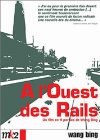Eye For Film >> Movies >> West Of The Tracks (2003) Film Review
West Of The Tracks
Reviewed by: Michael Pattison

At more than nine hours long, Wang Bing’s West Of The Tracks is a dauntingly massive documentary that matches the sprawling landscape at its centre — Shenyang’s Tiexi District, an industrial region in northeast China. Built in 1934 for the production of armaments, the industrial city had, by 1999, fallen deep into a long and irrevocable death agony, with its multitude of factories and workers’ homes left abandoned and dilapidated. Wang shot the film between 1999 and 2001, focusing on the few workers and residents left there.
The film is separated into three parts. “Rust” follows a small group of workers in a smelting factory, an electric cable factory and a sheet metal factory, all of which are under-sourced and in visible decline. “Remnants” concentrates on the teenagers who wile away their idle days in state-run housing estate Rainbow Row, awaiting their families’ imminent geographical displacement as a consequence of further factory closures. “Rails” focuses upon a father and son who survive in the region by selling the scrap metal and disused parts they find along the 20km-long railroad formerly used to import raw materials into, and export goods out of, Tiexi’s factories.

Wang opens his epic with what turns out to be his most panoramic vantage point, as well as the film’s longest part. “Rust” is a gargantuan document of a virtually defunct manufacturing economy, taking on almost abstract qualities through sheer persistence in its ground-level perspective. The director’s thinking, presumably, was to provide evidence of an unthinkably bereft social landscape — one that resembles something out of the futuristic dystopia of Tarkovsky’s Stalker — before showing the bedraggled facial contours of the very real people who continue to work there.
It’s an effective structural choice, rewarding those who make it to the final 2½ hours with two palpable protagonists in Du Xiyun, a one-eyed worker known among fellow employees for his resemblance to Lenin, and his 17-year-old son Du Yang, a lad who’s evidently desperate to have his adolescence supervised by his biological guardian — something rendered increasingly untenable by the immediate challenges they both face.
Perhaps the strongest scene in the entire film is that in which Yang confronts Xiyun after the latter is released from prison following his arrest (the reasons for which are barely elaborated upon). Drunk with grief and sobbing with resentment, Yang breaks down and falls to his knees, much to Xiyun’s embarrassment. The humiliation on display — of a teenager reduced to prolonged, pathetic wailing — is as powerful an indictment of China’s contradiction-riddled economy as any other the film offers.
As a portrait of specific consequences, though, West Of The Tracks shows limited interest in the objective social and historical roots behind Tiexi’s decline. A legitimate thorn in the side of any government claiming a harmonious progression into 21st century capitalism, Wang seems unwilling or unable to take that extra step into a solid, concrete analysis of the economic processes by which an entire purpose-built city of factories can go bust. When one worker remarks, “I can’t believe we’re bankrupt — it happened so fast,” we’re left as in the dark as he is.
On a visual level, the film is unvarnished. Restricted to the dimly lit workers’ break rooms for a large part of “Rust”, in particular, Wang is happy to sit observing his subjects with quiet, non-interventionist intimacy, something which makes the sporadic addresses direct to camera appear all the more revealing. Shot with a wide lens, the film’s images have an alien, almost sci-fi feel to them, with the optical distortion that defines the edge of frame suggesting something is deeply awry in Tiexi.
On an editorial level, meanwhile, the film is fairly flabby. While a documentary so appreciably long — and screened over three days at this year’s AV Festival on Tyneside — can often overwhelm viewers-cum-survivors into by-default praise, whether this film has to be as long as it is is debatable. As a consciously durational work, Wang’s epic poses a suitably gruelling challenge to viewers. But one suspects that if the director had given us another nine hours to spend along the abandoned railroads of Shenyang’s Tiexi District, no further light would be shed regarding the region’s actual plight.
Reviewed on: 04 Mar 2014

















